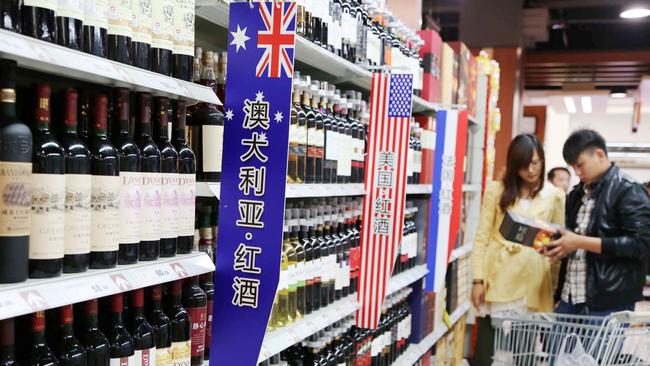Comments from a powerful Chinese ministry have raised hopes of a review of Chinese tariffs on Australian wine
The tariffs placed by an angry Beijing on Australian wine in 2020 snuffed out a $1.3bn export market, but there are now new hopes of a resolution that could open China again to winemakers.

The recent thawing of relations between China and Australia could see the crippling 200 per cent-plus tariffs on Australian wine reviewed or even lifted after a spokeswoman for a powerful Chinese government economic department hinted at possible talks and a resolution to the trade dispute.
It holds out hope for the nation’s $45.5bn wine industry, which covers every aspect of the sector from growing the grapes, making the wine to sales, cellar door hospitality and tourism, which has been forced to chase other international markets to claw back some of the super profits it enjoyed selling into China.
A successful outcome could see Australian wine once again take pride of place at cafes, restaurants and on the banquet tables of China, and allow Australian wine to reclaim the mantle as China’s most popular imported wine to once again knock out of the way competing wine nations such as France, Italy and Argentina.
Good news travels fast
On Friday word began spreading through the wine industry, political and trade circles that China’s commerce ministry was reported to have said it was willing to discuss tariffs that it imposed on Australian wine following a diplomatic dispute that began in 2020.
The tariffs placed on Australian wine sold into China, which ranged from 116 per cent to 218 per cent, all but destroyed a billion dollar-plus market for Australian winemakers with the tariffs slapped on our wine making them uncompetitive in the Chinese market.
It saw an immediate collapse in sales of Australian wine to China which before the tariffs hit a peak of $1.3bn in annual sales to only $12.4m for calendar 2022 as Chinese consumers switched to other, more cheaper wines, from countries such as France and Argentina.
But as trade relations between Beijing and Canberra show some signs of improving, which has raised hopes of bans lifted on Australian coal as well as other products such as timber and lobster, the nation’s wine industry could soon have its trade sanctions addressed.
It comes as Federal Trade Minister Don Farrell has been invited to visit China.

At a press conference in China a journalist asked the ministry spokeswoman about a recent takeover bid for an Australian mining company by a Chinese company and the issue of trade tariffs including the crippling tariffs on Australian wine.
“Regarding the first issue you mentioned. As I have just emphasised, China and Australia are important economic and trade partners, and the structure of the Chinese and Australian economies is highly complementary, and it is in the fundamental interests of the two countries and their peoples to develop mutually beneficial co-operation in the economic and trade fields,” said Chinese spokeswoman Shu Jueting.
“Regarding the second issue you mentioned (wine tariffs), China takes trade remedy measures against the relevant commodities and strictly abides by Chinese laws and regulations and WTO rules. China is willing to communicate with each other on some technical issues of concern in bilateral trade to find mutually beneficial and win-win solutions.”
Asked further about wine tariffs at the press conference, there was a promising response from the ministry spokeswoman.
“Mutually beneficial co-operation between China and Australia in the economic and trade fields is in the common interest of the two peoples. We are willing to work together with the Australian side to create a favourable environment for bilateral trade and investment co-operation, boost the confidence of enterprises in both countries and stabilise their expectations for future co-operation.”
She said China was willing to communicate “on some technical issues of mutual concern in bilateral trade and find mutually beneficial and win-win solutions.”
Lee McLean, chief executive of Australian Grape & Wine, the national representative body for grape growers and winemakers, told The Weekend Australian he welcomed the press conference comments and elevated hopes trade tensions between China and Australia - which have slugged the wine sector in the crossfire - could be cooled.
“The dialogue we have seen recently is positive, and it is good to see the relationship heading in the right direction towards stabilisation of that relationship.”
Shares rise
The news was also helpful to the share price of the nation’s key winemaker, Treasury Wine Estates whose shares rose against a broader falling market. Treasury Wine shares rallied 23c, or 1.63 per cent, to $14.38.
Treasury Wine, has seen its sales to China also massively shrink along with the rest of the nation’s winemakers, as its premier and luxury wine brands such as Penfolds and its famous Penfolds Grange wine faced a closed China market despite the huge popularity of its wine among Chinese consumers.
Treasury Wine chief executive Tim Ford suffered the loss of his most profitable market and has pushed through new initiatives such as sourcing wine for China from outside Australia, including a recent deal to sell a range of ‘made in China’ Penfolds for the local market.
The bruising impact to Australia’s wine industry from the tariffs imposed in 2020 have led to a complete collapse of the once billion dollar export market in China. Recent industry data showed wine exports to China from late 2020 had relegated that market to Australia’s 23rd largest wine market, with exports falling another 58 per cent by value to $12m in 2022, down from $1.17bn in 2019.
The positive signalling over wine comes as Chinese customs officials were preparing to clear a second cargo of Australian coal after the bulk carrier, Magic Eclipse, docked at Zhanjiang port late on Thursday.
Magic Eclipse’s cargo of Australian coking coal has been bought by Baowu Steel, the world’s biggest steel maker. Industry sources in China believe its well connected purchaser will not have any trouble clearing customs, who had halted Australian coal since late 2020.
Wider impact
Australia’s coal trade — previously worth $14.1 billion — officially resumed this week with the clearance of a separate cargo of 66,000 tons of Australian thermal coal at a nearby Guangdong port. The buyer was a state-owned energy company Taishan Power.
Australian and Chinese officials are currently negotiating over a date for Trade Minister Farrell to visit China, following a virtual meeting with China’s Minister of Commerce Wang Wentao.
Australian officials have indicated that concrete actions demonstrating China’s embargoes on Australian exports are being unwound are required for the trip to take place.
The Australian lobster industry has received indications from well-connected customers in China that a breakthrough in their trade — worth more than $750m in 2019 — could be weeks away.
“The signals are good,” one exporter told The Weekend Australian.
Beijing’s bans on coal and lobsters were never formalised, which makes them easy to unwind. China’s tariffs on wine and barley are much more complicated, as both followed an investigation by China’s Commerce Ministry and are now the subject of Australian challenges in the World Trade Organisation.
The comments by China’s Commerce Ministry suggest Beijing may be considering an off-ramp proposed by Senator Farrell.
The Trade Minister has previously told The Australian that the Albanese government intended to proceed with its wine and barley cases in the WTO, but was prepared to consider withdrawing them “on the basis that there’s some goodwill shown on both sides”.
“We’ve made it very clear to the Chinese government that we would much prefer to sort out our differences on trade issues by discussion rather than arbitrations through the World Trade Organisation process,” Senator Farrell said in late December.
“We believe we’ve got very strong cases. Obviously, if China was to drop the bans on barley and wine, well then, the circumstances change.”
Additional reporting: Heidi Han




To join the conversation, please log in. Don't have an account? Register
Join the conversation, you are commenting as Logout